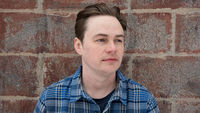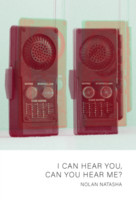"I Meet Expectations Now and Am Lost in the Trees" Read an Excerpt from Nolan Natasha's New Poetry Collection, I Can Hear You, Can You Hear Me?
Issues of identity and history are tackled in Nolan Natasha's new collection of poetry, I Can Hear You, Can You Hear Me? (Invisible Publishing), which explores gender, visibility and human connection in the modern age. At once humorous and heartbreaking, the interactions in this book happen over the phone, through walkie-talkies, in bathroom stalls and even in the silence that hangs between two bodies.
Confessional and intimate, but never taking itself too seriously, I Can Hear You, Can You Hear Me? asks the question of what being visible truly means. The poems in this collection will stimulate conversation and expand awareness, harshly illuminating the ways in which we deny and accept not only ourselves, but each other.
We're thrilled to share an excerpt from I Can Hear You, Can You Hear Me?, courtesy of Invisible Publishing.
An Excerpt from I Can Hear You, Can You Hear Me? by Nolan Natasha:
Queer
It’s not just that it means one thing
written in heavy books
from the university press and another in your mouth
as an answer and another on the stall door and another
hurled from a car on that Saturday in the spring,
on posters that grip telephone poles
Your CanLit News
Subscribe to Open Book’s newsletter to get local book events, literary content, writing tips, and more in your inbox
promising a good party—
it's something that argues with its own construction,
restless and glistening and grimy,
takes issue with the sentences of this poem.
In that bar on Queen Street, words and little pictures
etched by greasy fingers in the red plastic coating
on the candles. Drawings, obscene
and tender decorating the dark tables,
flickering into the establishment turned
home. The living room of our twenties and thirties.
We will dance and be sick,
sweat and stumble into each other’s vacancies.
The way our bathrooms feel dirty is different
than the bars with the big-screen TVs—soccer piss
and sweat is not the same.
Does this recital filter down to our bodily fluids,
or is there some smoke and mirrors
that causes his hands, but not his, to feel that way on my hips?
I am asking this sincerely.
Does the air only feel this way
because of some lesson in breathing?
Because of some lesson in breathing?
does the air only feel this way
I am asking this sincerely.
That causes his hands, but not his, to feel that way on my hips?
Or is there some smoke and mirrors,
does this recital filter down to our bodily fluids,
and sweat is not the same.
Than the bars with the big-screen TVs—soccer piss
the way our bathrooms feel dirty is different,
sweat and stumble into each other’s vacancies.
We will dance and be sick,
home. The living room of our twenties and thirties.
Flickering into the establishment turned
and tender decorating the dark tables.
On the candles. Drawings, obscene,
etched by greasy fingers in the red plastic coating
in that bar on Queen Street, words and little pictures
takes issue with the sentences of this poem.
Restless and glistening and grimy.
It's something that argues with its own construction.
Promising a good party—
on posters that grip telephone poles
hurled from a car on that Saturday in the spring,
as an answer and another on the stall door and another
from the university press and another in your mouth
written in heavy books—
it’s not just that it means one thing.
A boat sitting in the forest
Over the years, it has come to look more and more like a rock.
There is no way to know what the deer think.
I would have never known if you hadn't told me.
I think this is meant to be some kind of reassurance.
Invisibility.
Deep voice, broad shoulders,
I've had the mannerisms down for years.
The trick is to look at the eyes. The eyes don't change.
I meet expectations now and am lost in the trees.
If there are words
for what this feels like exactly, I don't know them.
You look like you. You sound like you.
Their relief is as unsettling as their discomfort.
It is the same thing.
You must feel so good.
The little things—
morning face in the mirror, a single thin white T-shirt
on a hot day,
swimming. I breathe easier—more.
My body is heavy. It knows where to go.
Mostly, it is the space
to see outside, that nothing is fixed—only closer, different.
Women's studies
Hours pass in the lecture hall of our beds.
My armpit, your left shoulder. On camera,
all of Quebec between us,
we’ll talk about how my stitches, and the wounds
they clench, dissolve in your gaze. But first,
let's get the orgasms out of the way, clear our heads.
Later, you'll read my shame and make an offering—
put it just so—like no one has:
That's not what that feminism is for, Nolan.
And I even believe
the things you see when you look at me,
my bare chest backlit by the lamp, your eyes scorched
with wanting.
The man I have become,
the girl I was long ago jumping from the swing set
landing with both feet in the gravel firm.
I was really there,
a kind of knowing.
You make it feel like that again,
easy to trust what is plain. We are who we are,
mountains hold power, and the geese are beautiful.
_____________________________
This excerpt is taken from I Can Hear You, Can You Hear Me?, copyright © 2019 written by Nolan Natasha.
Reproduced with permission from Invisible Publishing, Picton, ON.
Nolan Natasha is a queer and trans writer from Toronto who lives and writes in Nova Scotia. His poems have appeared in The Puritan, The Stinging Fly, Event, Grain, Prairie Fire, The Fiddlehead and Plenitude. He has been a finalist for the CBC Poetry Prize, the Ralph Gustafson Poetry Prize, the Geist postcard contest, Room Magazine‘s poetry contest, and was the runner-up for the Thomas Morton fiction prize.






